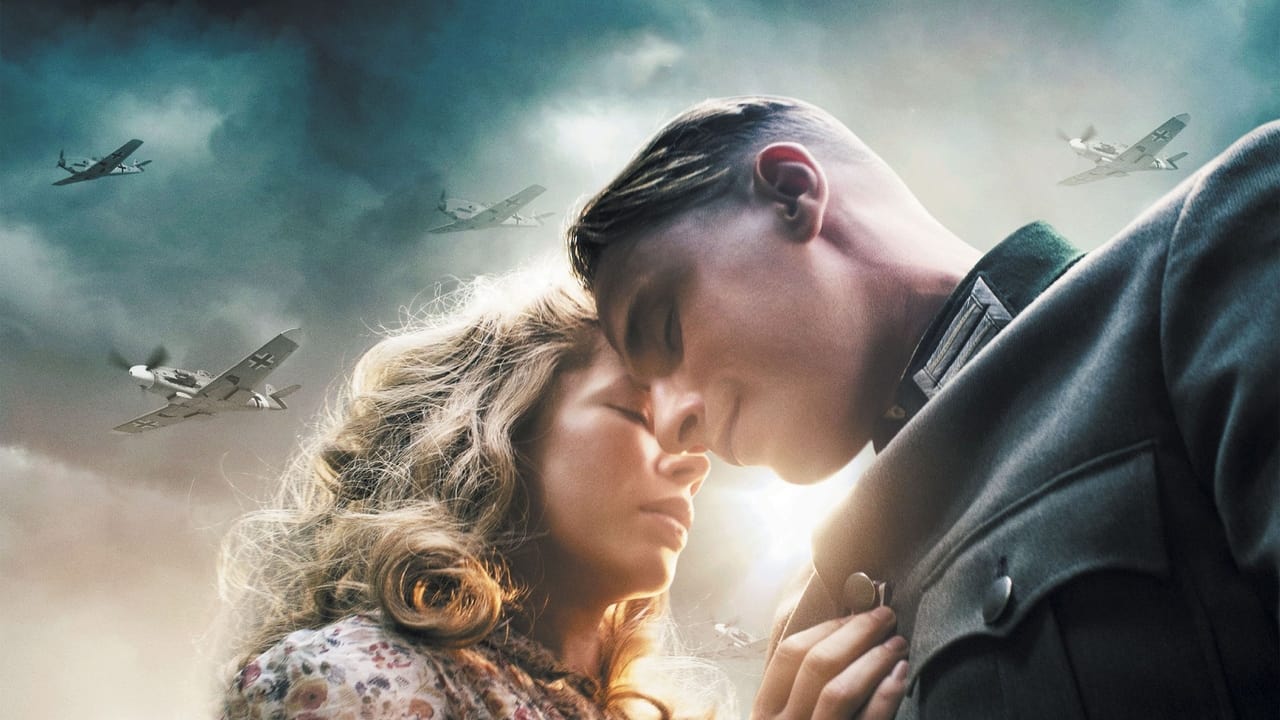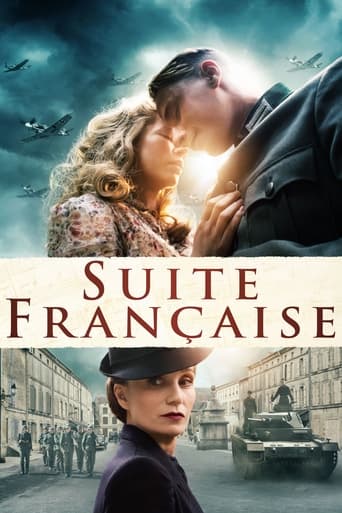



One of the best films i have seen
Each character in this movie — down to the smallest one — is an individual rather than a type, prone to spontaneous changes of mood and sometimes amusing outbursts of pettiness or ill humor.
View MoreAll of these films share one commonality, that being a kind of emotional center that humanizes a cast of monsters.
View MoreThe story, direction, characters, and writing/dialogue is akin to taking a tranquilizer shot to the neck, but everything else was so well done.
View MoreAbout the human side of war seen from both camps, the oppressor and the oppressed Michele Williams is as normal quite mesmerising to watch, and an atmospheric performance from Schoenaerts.
View MoreNow I like a floral frock and a well-pressed Nazi uniform (on screen, you understand) as much as the next gal, but I do find the nostalgic framing of WWII in the movies a little troubling – and 'Suite Francaise' is no exception. The hand of the BBC is everywhere visible in the production, from the costumes to the doughty cast of characters who could have come straight from the set of 'Poldark' or 'Lark Rise to Candleford.Michelle Williams plays 'the beautiful Lucille' (as described by the BBC) and Matthius Schoenaerts gives Ralph Fiennes a run for his money as the brooding, handsome and 'refined' (BBC again) Nazi soldier, his refinement on show for all to see via his wistful tinkling on Michelle's, erm, piano.The two, entirely predictably, fancy the pants off each other (or should that be cami-knickers) and various complications ensue, what with him being a Nazi and everything. But the moral of the story is that lurv and that old-British-chestnut 'common decency' prevail, wresting some kind of happy ending from the film and – by extension – the Nazi occupation of France.The film is based on a recently discovered manuscript. Irène Némirovsky, an ultra-nationalist Russian Jew exiled in France, wrote the stories while living under German occupation. In that context 'Suite Francaise' can perhaps be understood as an attempt to humanise an implacable enemy, the natural desire to have love triumph – at least in the imagination. The real story is remarkable and could have made an interesting film, since Irene Nemirovsky's end was not happy and neither love nor common decency prevailed: like 6 million other European Jews she was ultimately betrayed by the people she lived amongst and sent to Auschwitz, where she died.The unending nostalgia for WWII, envisaged as a time of moral simplicities and endless heroism, airbrushes the reality: that millions of 'ordinary' people in every nation in Europe collaborated with the Germans and shared their distrust and hatred of the Jews, while the wealthy admired the Nazis as a bastion against the political left.When poverty comes through the door, the saying goes, love flies out the window. Ignorant hatred of Muslims, xenophobia and anti-semitism are stalking the streets of Europe once again. We should resist these cosy fables, that reduce WWII to a lush setting for romance, and face up to the less palatable realities of our shared past – which no amount of lipstick can gloss over.For a grittier, more complex, troubling and interesting exploration of similar themes see Louis Malle's 1974 film 'Lacombe Lucien.'
View MoreIt's 1940 and France is on the verge of falling. Lucile Angellier (Michelle Williams) lives with her mother-in-law Madame Angellier (Kristin Scott Thomas) who ruthlessly collects rent from her tenant farmers. Her husband along with many of the men are away at war. She befriends poor farmer Madeleine Labarie (Ruth Wilson) and her crippled husband Benoit (Sam Riley). As France is occupied, the villagers are forced to billet German officers. The Angelliers are assigned Bruno von Falk (Matthias Schoenaerts). He's been assigned to read through the letters written by the villagers ratting out each other. Madame Angellier evicts the Josephs and Celine Joseph (Margot Robbie) is bitter for being forced into the barn.I really like all the supporting characters in the village. The conflicting paths are compelling and the same character often have opposing modes. The central romance is less appealing. This requires Michelle Williams to lose her senses and fall in a full-on romance novel relationship. She does her best but a younger and more naive actress would probably work better. It should be a relationship of intense trust issues but the movie is driving for romanticism. It's really wrong-headed. There are also other minor issues about the third act.
View MoreThis is a film of the first two volumes of a planned five-volume novel by Irène Némirovsky (aka Irina Lvivna Nemirovska, born in Kiev), born 1903, died in Auschwitz on 17 August 1942. Némirovsky was a successful Jewish writer living in France who in her lifetime published three novels, all of which were filmed: David GOLDER (1931, filmed a second time in 1950) and LE BAL (1931, filmed a second time in 1993). In 2015 a film was made in France of her novel DEUX. She was arrested as a Jew by the Gestapo just after finishing volume two of her final novel. The manuscript remained in a suitcase and was not looked at until 1998, when it was rediscovered and published in France to great acclaim. The female lead in this film is played by the amazing Michelle Williams, one of our most talented film actresses in the world, whose work I have previously had occasion to praise to the skies, as for instance in LAND OF PLENTY (2004, see my review) and INCENDIARY (2008, see my review). In this film she has a rather subdued role, of a young woman who is shy and emotionally suppressed, living under the tyrannical eye of an authoritarian other-in-law, played sternly by Kristin Scott Thomas. The other spectacular performance in the film is by Matthias Schoenaerts, He is a Belgian actor (his name is Flemish). He plays the polite Lieutenant in the Wehrmacht who is billeted in Michelle Williams's house. He is not only a classical pianist but a composer. The music he composes while he lives in the house he names 'Suite Francaise', hence the title of the film. It is a very pleasant piece of music originally composed for the film by Alexandre Desplats, the French film composer. The film is superbly directed by Saul Dibb, who also jointly wrote the screenplay. The story is extremely sad and full of pathos. It shows clearly the bombing of the columns of civilian refugees from Paris by the psychotic pilots of the Luftwaffe. As we now live in an age of refugees once again, it is possible to appreciate more fully the horrors experienced by the French refugees shown in this film. We have the usual sadistic Nazi assassination of a Mayor as a reprisal to the inhabitants of a small town. Such films serve to remind us always of what happened under Nazi rule. But the biggest revelation is the avalanche of letters informing on people, a massive betrayal by the French against themselves, eager to settle scores with their neighbours by turning them in to the Nazis, not bothering much whether the information provided is true or lies. We also see the Mayor openly collaborating with the occupiers (before he is shot, that is). The film is very powerful and emotionally upsetting, and an excellent cinematic achievement.
View More